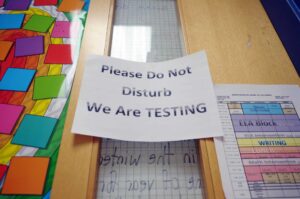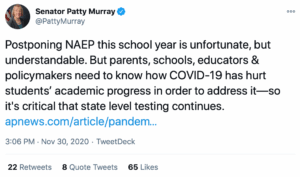By Dale Chu
 Uncertainty about the status of spring testing notwithstanding, schools and systems across the country are steeling themselves for what could be a long road ahead. Even as the pandemic intensifies, public officials are recognizing the importance of annual assessments to support a post-Covid recovery. States understandably had to forgo testing last spring and the NAEP has now been put on ice. Taken together, annual state tests in 2021 are arguably more important than ever.
Uncertainty about the status of spring testing notwithstanding, schools and systems across the country are steeling themselves for what could be a long road ahead. Even as the pandemic intensifies, public officials are recognizing the importance of annual assessments to support a post-Covid recovery. States understandably had to forgo testing last spring and the NAEP has now been put on ice. Taken together, annual state tests in 2021 are arguably more important than ever.
Earlier this month, North Carolina’s State Board of Education voted to move forward with seeking federal waivers for accountability purposes, but not for the administration of the tests themselves. Pointing to how the information is vital to determining how students are faring, board chairman Eric Davis said:
It’s fruitful that we not punish our institutions or our students for the situation that they are in at no cause of their own. But at the same time, I think an essential element of our education recovery from the pandemic is to get as much information as we can about where students are academically and be able to determine strategies, resources, personnel about how to move our students forward.
Echoing this sentiment and urgency, a recent op-ed that ran in Ohio made the argument that state tests provide essential and objective information on whether students are on track to meet grade-level standards. Notably, according to a local survey, 85% of parents in the state would like annual testing to proceed as scheduled.
Further south, a parent advocacy group in Tennessee had the following to say about the importance of testing during the pandemic:
We are losing students at alarming rates, and we need education leaders and policymakers to build a plan for academic recovery – but they cannot do so without quality data to determine where students are and how intense the learning losses are across Tennessee communities.
Indeed, it’s hard to improve anything without some form of measurement. Trying to do so would be analogous to flying blind, which is what states will be doing if they take a pass on testing for a second consecutive year. The Collaborative for Student Success’ Jim Cowen hammers this point home:
As we look to the spring, we must prioritize getting teachers a complete and consistent picture of how each student is doing. State assessments will do just that. States should administer assessments to all students to help teachers meet every child’s unique needs and support them in the areas where they need extra help. And, the federal government should ensure this happens.
The feds would seem to agree. Last month, Senator Patty Murray (D-WA), ranking member of the Senate Health, Education, Labor and Pensions Committee, tweeted:
To be sure, the politics surrounding state testing are anything if not complicated—all the more so now that it looks as if most schools will remain physically shuttered through the winter and spring. But it’s good to know that—for the time being at least—local, state, and federal leaders are coalescing around the need for valid and reliable testing data to ensure all students receive the help they deserve.

